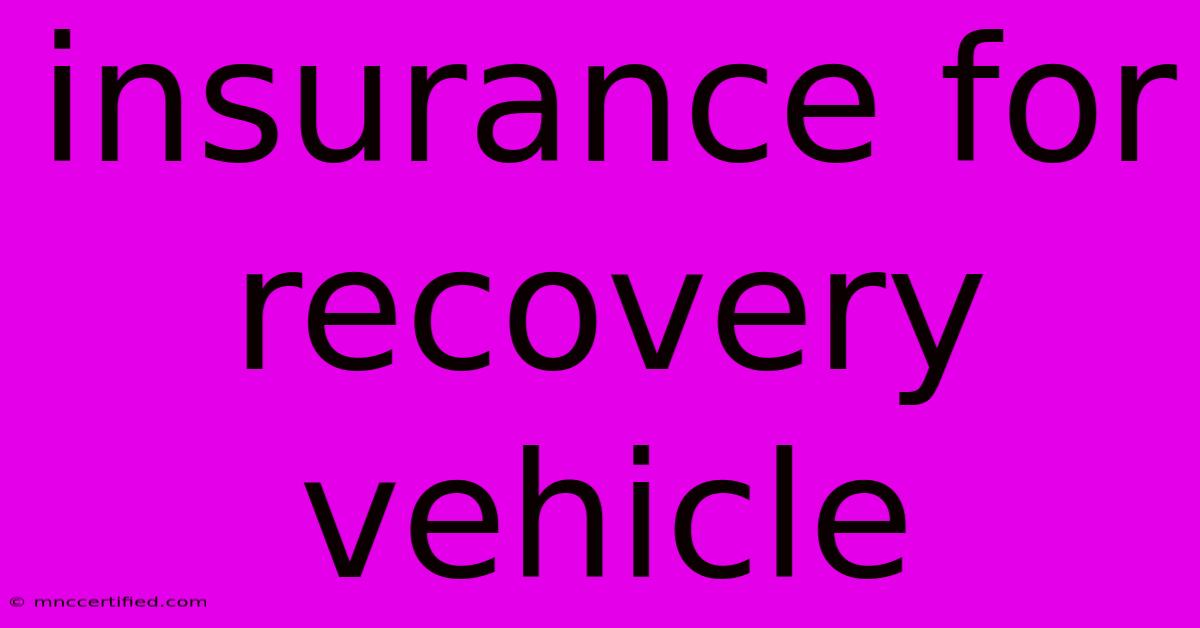Insurance For Recovery Vehicle

Table of Contents
Securing Your Business: The Ultimate Guide to Insurance for Recovery Vehicles
Owning and operating a recovery vehicle is a demanding business. From navigating challenging roadside situations to handling delicate and valuable cargo, the risks are substantial. Protecting your investment and your livelihood requires comprehensive insurance coverage. This guide delves into the specifics of insurance for recovery vehicles, ensuring you're adequately protected.
Understanding the Unique Risks of Recovery Vehicle Operations
Recovery vehicle insurance isn't a one-size-fits-all solution. The risks you face are unique, depending on factors such as:
- Type of recovery vehicle: A light-duty wrecker faces different risks than a heavy-duty rotator or a specialized recovery truck.
- Geographic location: Rural areas might present different challenges (e.g., long distances, poor road conditions) than urban environments.
- Types of vehicles recovered: Recovering luxury cars demands higher liability coverage than towing standard vehicles.
- Frequency of operations: Higher operational frequency increases the chances of incidents.
Ignoring these nuances can lead to inadequate coverage and potential financial ruin.
Key Risks to Consider:
- Accidents involving your recovery vehicle: Collision damage, property damage, and injuries to third parties require robust liability and collision coverage.
- Damage to recovered vehicles: Accidents during towing, improper loading/unloading, and unforeseen damage necessitate comprehensive coverage for the vehicles in your care.
- Cargo liability: If you transport valuable goods or equipment, securing cargo insurance is paramount.
- Employee injuries: Workers' compensation insurance protects your employees in case of on-the-job injuries.
- Public liability: This protects you against claims from third parties injured or whose property is damaged due to your operations.
Essential Insurance Coverages for Recovery Vehicles
Choosing the right insurance policy involves understanding the different coverages available:
- Public Liability Insurance: This is crucial. It protects you against claims for injury or damage caused by your business operations. The amount of cover should reflect the potential value of claims.
- Employer's Liability Insurance (if applicable): If you employ others, this protects you against claims from employees injured at work.
- Road Risk Insurance: Covers damage to your recovery vehicle caused by accidents or other incidents on the road. This often includes collision and comprehensive coverage.
- Goods in Transit Insurance (Cargo Insurance): Essential if you transport recovered vehicles or other goods. This covers loss or damage during transit.
- Breakdown Cover: Ensures assistance in case of vehicle malfunctions, minimizing downtime and potential losses.
- Legal Expenses Insurance: Covers legal costs associated with accidents or disputes.
Finding the Right Insurance Provider
Shopping for recovery vehicle insurance requires careful consideration. Don't just look at the price; compare:
- Coverage levels: Ensure the policy adequately covers your specific risks.
- Excesses: Understand the amount you'll pay upfront before the insurer covers claims.
- Claims process: A smooth and efficient claims process can save you time and money.
- Customer service: A responsive and helpful insurer is invaluable during challenging situations.
Pro Tip: Contact multiple insurers to compare quotes and ensure you secure the best possible coverage for your needs. Provide accurate details about your operation to get the most relevant quote.
Beyond the Basics: Optimizing Your Insurance Strategy
Several strategies can enhance your insurance protection:
- Risk Management: Implement robust safety protocols to minimize accidents and claims. Regular vehicle maintenance and driver training are vital.
- Accurate Record Keeping: Maintain detailed records of all operations, including incident reports and vehicle condition assessments. This aids in claims processing.
- Regular Policy Review: Your insurance needs may change over time. Regularly review your policy to ensure it remains suitable for your business.
Investing in the right insurance for your recovery vehicle isn't just about protecting your assets; it's about safeguarding your business's future. By understanding the risks, choosing the appropriate coverage, and implementing effective risk management strategies, you can operate with confidence and peace of mind.

Thank you for visiting our website wich cover about Insurance For Recovery Vehicle. We hope the information provided has been useful to you. Feel free to contact us if you have any questions or need further assistance. See you next time and dont miss to bookmark.
Featured Posts
-
Planning Rutgers Msg Basketball Game
Nov 27, 2024
-
Lower Mortgage Rates Barclays Announcement
Nov 27, 2024
-
Manchester City Vs Feyenoord Live Cl Stream
Nov 27, 2024
-
St Johnstone Fan Zone Aberdeen Alcohol Plan Rejected
Nov 27, 2024
-
Unc Fires Football Coach Brown
Nov 27, 2024